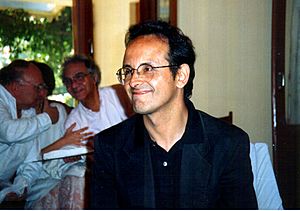Francisco Varela facts for kids
Quick facts for kids
Francisco Varela
|
|
|---|---|

Varela in 1994
|
|
| Born | September 7, 1946 Talcahuano, Chile
|
| Died | 28 May 2001 (aged 54) Paris, France
|
| Alma mater | Pontifical Catholic University of Chile; University of Chile; Harvard University |
| Scientific career | |
| Institutions | École Polytechnique; CNRS; Mind and Life Institute |
| Thesis | Insect retinas; visual processing in the compound eye (1970) |
| Doctoral advisor | Torsten Wiesel |
Francisco Javier Varela García (born September 7, 1946 – died May 28, 2001) was a smart Chilean scientist. He was a biologist, philosopher, and neuroscientist.
He is best known for two big ideas. First, he worked with his teacher, Humberto Maturana, to create the idea of autopoiesis. This describes how living systems can create and keep themselves going. Second, he helped start the Mind and Life Institute. This group helps scientists and people who study Buddhism talk to each other.
Life and Career
Francisco Varela was born in 1946 in Talcahuano, Chile. His parents were Corina María Elena García Tapia and Raúl Andrés Varela Rodríguez. He went to high school in Santiago.
Like his teacher, Humberto Maturana, Varela first studied medicine. Then he switched to biology. He earned his biology degree from the University of Chile. Later, he went to Harvard University in the United States. There, he got his Ph.D. in biology in 1970. His main project was about how insect eyes work.
After a big change in Chile's government in 1973, Varela and his family had to leave the country. They lived in the United States for seven years. Later, he came back to Chile. He became a biology professor at the University of Chile.
In the 1970s, Varela started learning about Tibetan Buddhism. He studied with important meditation teachers. These included Chögyam Trungpa Rinpoche and Tulku Urgyen Rinpoche.
In 1986, Varela moved to France. He taught about how the mind works at the École Polytechnique. He also taught about the brain at the University of Paris. From 1988 until he passed away, he led a research team. This was at the CNRS, a big science research center in France.
In 1987, Varela and R. Adam Engle started the Mind and Life Institute. They wanted to create talks between scientists and the 14th Dalai Lama. These talks were about how modern science and Buddhism are connected. Today, the Institute still brings these groups together. It also supports science studies on the mind and meditation.
Francisco Varela died in 2001 in Paris, France. He had a liver illness. He wrote about his liver transplant from 1998. Varela had four children. One of them is the actress and environmental speaker, Leonor Varela.
Work and Important Ideas
Varela was trained in biology, math, and philosophy. His teachers, Humberto Maturana and Torsten Wiesel, greatly influenced him.
He wrote many books and articles. These covered topics like biology, neurology, how the mind works, mathematics, and philosophy. He also helped start the Integral Institute. This group helps different ideas and subjects work together.
Varela believed in something called "embodied philosophy." This idea says that how we think and what we are aware of comes from our bodies. It also comes from how our bodies interact with the world around us.
He helped make the idea of "neurophenomenology" popular in brain science. This idea combines studying how people experience things with scientific methods. It asks scientists to look at their own conscious experiences.
In 1996, physicist Fritjof Capra wrote a popular book called The Web of Life. In this book, he talked a lot about Varela and Maturana's idea of autopoiesis. This idea helps us understand how everything in nature is connected. The book helped many people learn about Varela's work.
Varela's 1991 book, The Embodied Mind, is very important in the field of cognitive science. He wrote it with Evan Thompson and Eleanor Rosch. The book connects ideas from Buddhism with how the mind works. It talks about how our body and actions shape our thoughts. A new version of this book came out in 2017.
See also
 In Spanish: Francisco Varela para niños
In Spanish: Francisco Varela para niños
- Autopoiesis
- Buddhism
- Cartesian anxiety
- Charles Laughlin
- Daisetsu Teitaro Suzuki
- Dan Zahavi
- Eleanor Rosch
- Enactivism
- Embodied cognition
- Gerald Edelman
- Humberto Maturana
- Jakob von Uexküll
- Jerome Bruner
- Lawrence Barsalou
- Meaning making
- Maurice Merleau-Ponty
- Molecular Cellular Cognition
- Phenomenology
- Neurophenomenology
- Neurodynamics
- Umwelt
- Vittorio Gallese
- Vittorio Guidano
- Wolfgang Prinz
 | William Lucy |
 | Charles Hayes |
 | Cleveland Robinson |

